�� Selected Poems of Chen Li
Introduction
to His Poems
mail to![]() Chen
Li
Chen
Li
![]()
![]()
![]()
![]()
![]()
![]()
![]()
![]()
![]() Home
Home
�@
Top 20 Poems
by
Chen Li
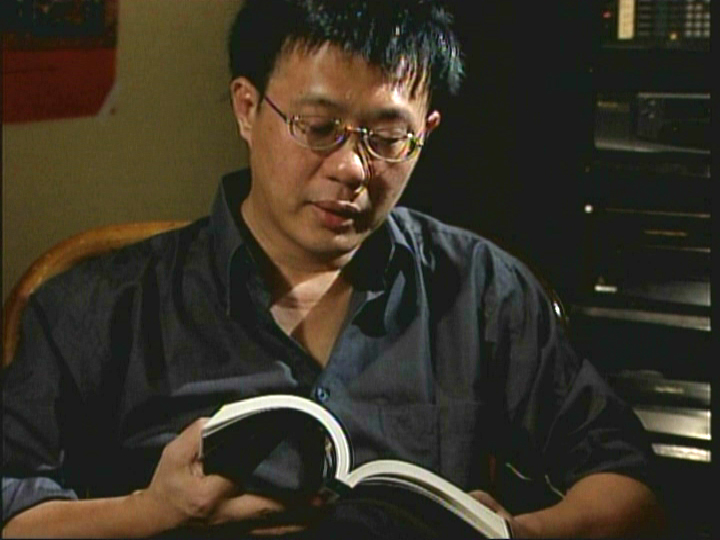
�@
11. Footprints in the Snow (two versions)
15. In the Corners of Our Lives
�@
1. A War Symphony
�Ԫ����T��
��See
an animation of the poem
by Wu Xiu-jing & the poet reading it
Note:
The Chinese character �L (pronounced as "bing") means "soldier."
�� and �� (pronounced as "ping" and "pong"), which look like one-legged soldiers,
are two onomatopoeic words imitating sounds of collision or gunshots.
The character �C (pronounced as "chiou") means "hill."*
�Ѫk�a�_���൧�U���m�Ԫ����T���n
Calligraphy by Yu Ming-Quan ��
�X�X from The Edge of the Island
�@
�@
�@
�@
2. Microcosmos
(12
selections)
�p�t�z
�^���� ø����Illustrated by Peng Chih-wei
��See Chen Li reading eleven poems from Microcosmos (in Chinese)
�@
I wait and long for you:
a rolling dice in the empty bowl of night
attempting to turn on a seventh side
�@
�ڵ��ԡA�ڴ���A�G
�@�ɻ�l�b�]���ŸJ��
������X�ĤC��
�@
*
A great event on the desolate
winter day: ear wax
drops on the desk
�I��V��̪����j
�ƥ�G�@���ի�
�����b�Ѯ�W
�@
*
Multiplication table for kids of cloud and fog:
mountain times mountain equals tree, mountain times tree
equals me, mountain times me equals nothingness�K
�����p�Ī��E�E���k���G
�s���s�����A�s����
�ڡA�s���ڵ����L�K�K
�@
*
All the sorrow of night will be turned into golden
ears of rice by daylight, to be
reaped by another sorrowful night
�@
�Ҧ��]�ߪ��~�˳��n�b�դ�
�ন�������_�J�A����
�t�@�Ӽ~�˪��]�ߦ���
�@
�@
*
"Which runs faster, grass or dust?"
after a spring shower, beside a deserted railway
someone asked
�@
�u��M�K�ֶ]�o��֡H�v
�K�B��A�o���K�D��
���H�ݧ�
�@
�@
*
White skin turns a mole
into an isle: I miss the glistening
vast ocean within your clothes
�@���i�]���骺��
�����@�y�q�G�ڷQ��
�A��A�̪i���U������
�@
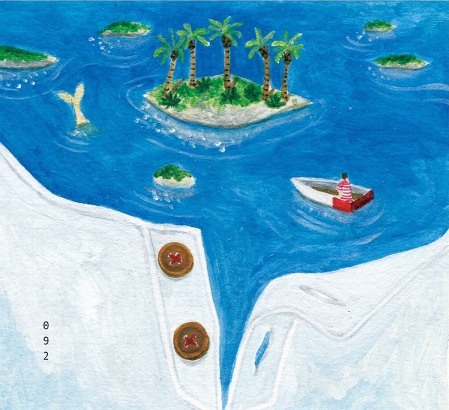
�@
*
Sandals throughout the seasons: do
you see
the free verse my two feet write, treading
upon the blackboard, upon the dust?
�@
�D�c���|�u�G�A�ݨ��X�X
��L�ªO�B�ǹСA�ڪ��Ⱖ�}
�g���ۥѸֶܡH
�@
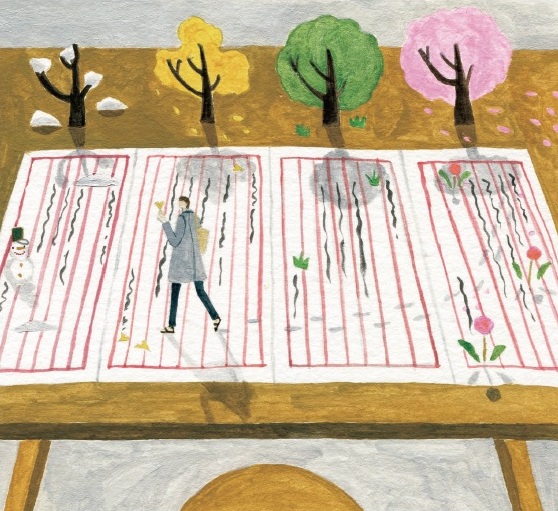
*
The story of marriage: a closet of loneliness plus
a closet of loneliness equals
a closet of loneliness
�B�ê��y�G�@�Ӧ��d���I��[
�@�Ӧ��d���I�浥��
�@�Ӧ��d���I��
�@
Amour, or no more?
I say amour, you say no more; I say
no more no more no more, you say amour I mourn no more ��
�R�A�Ϊ̭��H
�ڻ��R�A�A�����F�ڻ�
�������A�A���R�s��
�@
�@
*
Chirping competition:
zero-year-old old cicadas teach zero-year-old
baby cicadas to sing Happy Birthday
�@
����G
�ݷ������ͱТݷ���
���Ͱۡu�ͤ�ּ֡v
�@
*
Ah man, come and
take a selfie:
encaged
�H�ڡA�Ӥ@�i
�s�b���g�u�G
�}
�@
* *
Having constantly broken world records
our lonely shot-putter throws his head out
in one put
�b���_���}�@�ɰO������
�ڭ̩t�I���]�y���A�@�|
��ۤv���Y�Y�X�h
�@
�@
*
Violent love brought about pleasant injury:
I perspired the sweat equivalent to five boxes of grapefruit
you had twenty-one hairs broken
�@
�E�P���R�a�Ӫ��r�֪��ˤ`�G
�ڬy���F���c����c������
�A���_�F�G�Q�@���Y�v
�@
�@
*
Great fleeing: let me hide inside
you, like water melting in water,
seen by the world, found by no one
�@
�j�k�`�G������b�A
�̭��A����������A�Q
���@�ɬݨ��A�S�S���H�o�{
�@
�@
(1993 / 2006)
Translated by Chang Fen-ling
&
��Jennifer
Feeley
�@
�� Chen Li reading in Chinese & English two poems from Microcosmos in Macau
�@
�X�X from Microcosmos
�@
�@
�@
�@
On the world map
on a scale of
one to forty million
our
island is an imperfect yellow button
dangling on a blue uniform
My existence is a transparent thread
thinner than spider's silk, going out my window facing
the sea to bind the island and ocean together
At the edge of lonely days, in the crevice
between the new year and old
thought is like a book of mirrors, freezing
the ripples of time
Thumbing through it, you��ll see pages of an obscure
past, flashing upon each mirror
another secret button�X
like an invisible tape recorder, pressed against
your breast, repeatedly recording and playing
your and all of mankind's memories�X
a mix tape of love and hate
dream and reality, sorrow and joy
What you hear now is
the sound of the world
the heartbeats of all the dead and living
plus your own. If you call with all your heart
the dead and the living will speak to you
in clear voices
At the edge of the island, on the boundary
of sleep and awake
my hand is holding my needle-like existence
threading through the yellow button polished and rounded
by the island people, piercing hard into
the heart of the earth beneath the blue uniform
�@
*
��See Chen Li reading the poem "The Edge of Island" in Chinese at his hometown Hualien
�@
�@
�b�Y�ؤ@��|�d�U���@�ɦa�ϤW
�ڭ̪��q�O�@�ɤ����㪺���s��
�P���b�Ŧ⪺��A�W
�ڪ��s�b�p���O�@�\��ﵷ�ٲӪ�
�z�����u�A��L�������ڪ����f
�ΤO��q���M�j���_�b�@�_
�b�t�I���~�몺��t�A�s���@��
�M�ª��@��������_��
�߫�p�@�U��ѡA�N�N�a������
�ɶ����i��
½�\���A�A�ݨ�@�����ҽk��
�L�h�A�b�譱���G�a�{�{
�t�@�ɯ��K�����l�X�X
�����Ϊ��������A�K�b�A���ݫe
��A���M�H�����O��
���|�a�����B����
�V�X�۷R�P��A�ڻP�u
�W���P�߮��������a
�{�b�A�Ať�쪺�O
�@�ɪ��n��
�A�ۤv���M�Ҧ����̡B�̪ͪ�
�߸��C�p�G�A�ΤߩI�s
�Ҧ������̩M�̱ͪN�M���a
�M�A����
�b�q����t�A�b�ίv�P
�d�������
�ڪ��ⴤ���p�w���ڪ��s�b
��L�Q�q�W�H������i��i�G��
���s���A�ΤO��J
�Ŧ��A�᭱�a�y����Ŧ
�@
(1993)
Translated by Chang
Fen-ling
�@
�X�X
from
Traveling in the Family
![]()
�����ֶ��m�a�x���ȡn
�@
�@
�@
�@
![]() ��
Hear Chen Li read the poem in Chinese
��
Hear Chen Li read the poem in Chinese
In the night I turn into a fish
an amphibian
suddenly rich and free from having nothing
Emptiness? Yes
as empty as the vast space
I swim in a night darker and wetter than your vagina
like a cosmopolitan
Yes, the cosmos is my city
Seen from any of our city swimming pools
Europe is but a dry and shrunken piece of pork
and Asia a chipped tea bowl by a stinking ditch
Go fill it with your sweet familial love
fill it with your pure water of ethics and morality
fill it with your bathwater replaced every other day
I am an amphibian
with nothing and with nothing to fear
I perch in the vast universe
I perch in your dreams each day and night
A bather bathed in rain and combed by wind
I swagger across your sky
across the death and life you can never escape
Do you still boast of freedom?
Come, and appreciate a fish
appreciate a space fish suddenly rich
and free, because of your forsaking
�@
*
��Chen Li reading the poem "Nocturnal Fish"
�@
�i�p�ơE���A��Ū�j������Ū�q�]�����r![]()
�@
�b�]���A���ܦ��F�@����
�@�Ӧ]�@�L�Ҧ���M�I���B�ۥѰ_�Ӫ�
�����
��L�H�O��
��L�@�p�E�v���Ӫ�
�ڪs��b��A�����D�����ٶª��]��
���@�ӥ|�����a���H
�O���A�t�z�O�ڪ�����
�q�ڭ̥���@�y���ߴ�a�����U��
��ù�ڥu���L�O�@����ç���ަ�
�ӨȲӨȥ����O������Ǫ��}���J
�h�˧A�̪����e�˱��a
�˧A�̭۲z�B�D�w���ն}��
�˧A�̹j�Ѵ��@�����~����
�ڬO�@�Ӥ@�L�Ҧ��S�@�L���ߪ�
�����
�Ϯ��b�E�v���t�z
�Ϯ��b�A���]�]���ڸ�
�@���ͭ��N�B���N�D��
�j���j���a��L�A���Ѫ�
��L�A�L�Ұk�P���ͥͦ���
�A�٭n��ģ�A���ۥѶܡH
�ӧa�A��{�@����
��{�@���A�]�A���A��M�I��
�ۥѰ_�Ӫ��Ӫų�
(1994)
Translated by Chang Fen-ling
�@
�X�X from The Edge of the Island
�@
�@
�@
�@
�@
5. A Lesson in Ventriloquy�@
�� Music: Hong Chung-Kun / Image: Wu Xiu-jing
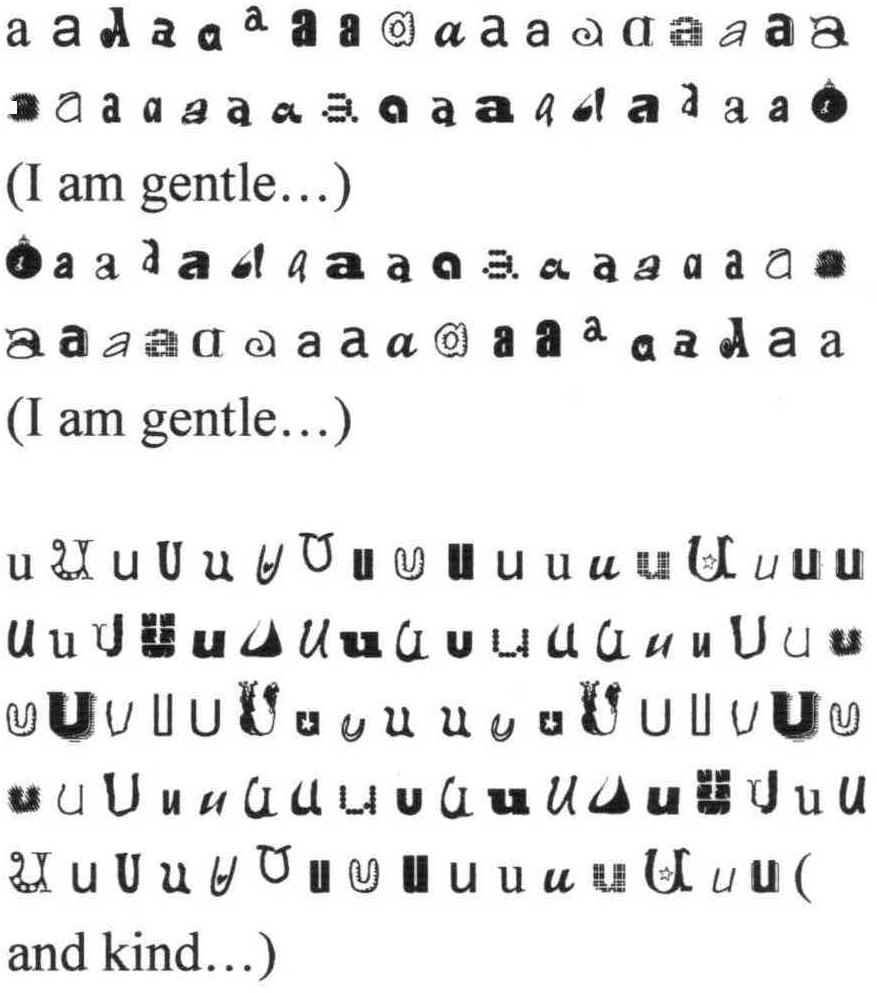
�@
*
�c�Ū��Ȼ~������E�g��������ڲ����;
�c�Bظ�����W�����t�|�O�Vܪ�Q���|����
�]�ڬO�ŬX���K�K�^
�����|���Qܪ�V�O�|�t�����W����ظ�B�c
;����ڲ���������g�E���뮩�~�Ȫ��Ŵc
�]�ڬO�ŬX���K�K�^
�c�j�X�k�̹K����s���_�h��ݦ���G����
�E�c�j���mˮ������������Y����خ����
���K�����~���F�إإ��F���~�ް��K��
����خ�����Y������맰���ˮ�m���j�c�E
���G��ݦ���h�_���s����K�̶k�X�j�]
�ӥB���}�K�K�^
(1994)
Translated by Chang Fen-ling
Note:
Ventriloquy is an art of speaking with no or little lip movements. This poem can be viewed as a variation on the theme of the Beauty and the Beast, monologue done by a man, or the beast, toward his beloved, the beauty. A man has wanted to speak words of love or make some confession to his beloved. He tries very hard to use ventriloquy to say ��I am gentle and kind,�� but somehow, he is too nervous or too shy to express himself properly. Before the right words are uttered, what come out are numerous twisted sounds which either seem unrelated or imply evil intentions. The beast produces a lot of odd-looking words with the same sounds. Chen Li obviously found all the weird characters with the help of the computer for this audio-visually striking Chinese poem.
���G�q���y�ҡr���@�����A���֥D�n�Ѹ��c
(��`) �P�c (��`)
�P�����@��r�զ��A���ܪ̱��V��ҷR�̪��F�ߤ��ŬX���}�����N�A���N�o�R�X�@��c�δc�����y�r�C
*
��The whole song Music: Hong Chung-Kun / Soprano: Lee Chia-Yi
�@
�@
�X�X from The Edge of the Island
�@
�@
�@
�@
�@
�@
13
That famous painting master
Da-qian, with his trembling hand
touching his beautiful beard, more elusive than mountain cloud and fog
painted nostalgia extravagantly with half-abstract splashes of ink on your
concrete face
They painted the picture of the Yangtze River on your mountain wall
Yet you are not landscape, not the mountains and rivers in the Chinese landscape
painting
What hangs down from your forehead is neither Li Tang's Whispering Pines in the Mountains
nor Fan Kuan's Traveling among Rivers and Mountains
To those who visit you in air-conditioned tourist buses
you are beautiful landscape
(They are just like the Portuguese who cried out "Formosa"
in a strange tone when their ship
passed by the ocean in the east four hundred years ago)
Yet you are not Formosa, though you are beautiful
You are not the landscape to be carried, hung, or displayed
You are living, you are life
you are the great and truthful existence to
those people of yours
who vibrate and breathe with the pulse of your veins
4
We pass by Huitowan
and arrive at the suspension
bridge where stand nine plum trees
At the place where Japanese policemen used to be stationed, a modern postman
happily distributes mail into different mailboxes
It may be taken away by the old veterans living at Water Lily Pond
who will cross the suspension bridge after two hours' walk
or by the women living at Plum Village
who will come jolting all the way down in a cart
You jolt along
into the evening village
A healthy village boy runs excitedly to greet you
His agile figure is like the wild deer that his maternal grandfather
hunted fifty years ago
"Papa
has made good tea for you!"
Bamboo Village, the name of their hometown
so much like the poetry of Tang Dynasty his father read in his youth
Just like the Atayal people who plowed and hunted here fifty years ago
they crossed the sea and became the owners of the land
growing their fruit trees, raising their children
6
how simple and yet complicated the low, repeated chanting is�X
tolerating the infinitesimal and the vast
tolerating the distressed and the joyous
tolerating strangeness
tolerating imperfection
tolerating loneliness
tolerating hatred
Just like the low-browed benevolent Bodhisattva, you too are
the silent Goddess of Mercy
impartially looking on the creation of the heaven and the earth, the death
of trees and the birth of insects
The landscape speaks aloud, the skies are boundless
I seem to hear the calling of life to life
It goes through the crystal look of mountains and waters
through the caves of eternal echoes
and reaches tonight
The towering mountain
walls lie flat at the bottom of my heart like a grain of sand
Note
The above are the
ancient names of the places in
Taroko Gorge. In the Atayal language they refer to
different meanings.
For example, Tupido, now called Tianxiang, originally means
"palm
tree;" Losao originally means "swamp;"
Tabokyan originally means "sowing;" Putsingan
originally means "a must for passing;" Bolowan originally means "echo."
�@
Tianxiang: a place in Taroko Gorge, named after Wen
Tian-xiang (1236-1282), a heroic character in the last reign of Sung Dynasty,
who fought
against the invaders only to be captured.
Refusing to surrender, he was executed after
three years'
imprisonment.
Before the execution, he wrote The Song of
Righteousness to express his loyalty and patriotism for the native land.
Huaqing Pool and Mawei Slope: names of places in Tang Dynasty.
Yang
Yu-huan (719-756), Tang Xuan-zong's favorite concubine, bathed in the former, and was
forced to hang herself on the latter.
Da-qian (Zhang Da-qian, 1899-1983): a master of
the traditional Chinese water-and-ink painting. Living in Taiwan in the last years
of his
life, he painted mostly the scenery of Mainland China.
Li Tang and Fan Kuan:
two major Chinese painters of Sung Dynasty, famous for their landscape
paintings.
Formosa (meaning "beautiful"):
another name for Taiwan given by the Portuguese who reached it in 1590.
The indigo (Indigofera ramulosissims) and the euphorbia (Euphor-bia tarokoensis): two rare species
of plants found in Taroko Gorge.
In Part Four,
Chen Li lists twenty images of search, which is an attempt to lead readers into
the heart of Taroko Gorge to look for its
origins,
to take a glimpse at "the secret of the humble residence on earth."
He also lists
forty-eight ancient names of spots in Taroko Gorge.
To the outsiders, they may be
meaningless sounds, but to the Atayals, they are significant, vividly revealing the local
features.
The reason why
Chen Li makes such a long list is obvious: he is eagerly inviting
readers to go on a journey of retrospection to the lost culture of Taiwan.
(1989)
Translated by Chang
Fen-ling
�@
��See a short video of Chen Li's "Taroko Gorege, 1989" with the poet reading it
�@
1
�b�L�B���K�H�̫���A�R�q�����q
���e�s�O�@�˱K���K��
�U�Q�s���p�@�ɨF����ߩ�
��������
������y��B�R��d��
���ŬX�ϩ��I�l
�p�@���������A�p�@�����}��
�S�ϩ��@��ᤧ�}��
�b�~�k���ƪ��ɳ�����
���`�H�ǭW�o�P�g��
���Y�Y�c�{���B�L
���Ū��P�šA���E�V
�p�߲�V��
��L�h�L���b���s�x
�b�D��������
�ڧϩ�ť���ͩR��ͩR���I��
�b���~�C�����`��
�b�Q�]��ı���ڹ�
�ڧϩ��ݨ��Q�ɶ�����B������
���v���E��
�b���K���骺����
�b�å۱Y�|������
�������p������
�b�L�a�ɤs�P�s�������
�b�L�a�ɤѻP�a���M�Ӹ�
�M�ӧA���u�O�������y�a�ݵۧ�
�樫�L�A���s��
�ݵۧڡA�@���S�@���a
�b�A�����e����
�@�p�d�ʦ~�Ө��Ǧb�A�h��
�^�˪��A�y�媺�A���h��
2
�h�֦��A�A���A���Ĥl�b�A���h��
�^�ˡA���ˤS���_��
�h�֦��A�A���L�̦b�G���|�G���K�L
��i�åB�g��
�A�ݨ��C�K�����r���q
�H����y�J�������j��
�A�ݨ��B���t���ڤ�
�w�w������j���ڤ�
�A���L�̴M�V�@���Y���R���H��
�A���L���k�ʵ����n�i�J����
�b�ɫB������
�A���L�̦�ߦb�_�����V��
�ݺw�����
�ݳu�̦p���Ҥ��ٱީ]
�u�̦p���Ҥ��ٱީ]
�A������Z���H��A���l�f�Ĩ����
�A���������H��A���l�f�Ĩ����
�A���Q���{�H�X�v�L��������H��A���l�f�Ĩ����
�A���X�v�����{�H���饻�H��A���l�f�Ĩ����
��A���l�f�v�S�A�[���A���H
��A���s�y�v�S�A�[���A���H
��A�����Y�v�S�A�[���A���H
�Ať���i�Ӫ��~�H��M�U���H���G
�u�뭰�a�A�Ӿ|�յf�I�v
�Ať���i�Ӫ��饻�H��j�U���H���G
�u�뭰�a�A�Ӿ|�յf�I�v
�A�ݵۯ������L�̺����q�`�s�E���s�S
�q�s�S�E������
�A�ݵۥL�̺������}�L�̪��a
�������y
�@
3
�A�ݵۥL�̺������}�L�̪��a
�Ө�A������
���dzQ����H�X�v�L��������H
�a�۾Ծl�����ġA�m�T�A���g��
�L�̦b�A�����f���}�w�s����
�������ܩ�ۤv�������G�D
������۸��ۨH�J�ë����`�W
�����d�U�@����A�@���}
�ǰ��ݪ��߭���
�����汼�³T�A���_�S�Y
�b�s�}�����ǰv�߷s�����P
��۷s�{�Ѫ����m�k�l�A�L�̾Dz�
���K�A�V��A�c��
�@�p�@�M�M�ؤU�h���[�{���A���R��A�G�Q�@����
�L�̧�ۤv�ضi�A������
�L�̧�s���a�W���b�s�}�����W
�K�Ѫ��ɭ�
�L�̰��j����S�A���۳Գ�
��@�ӥs�Ѳ����a��߽ศ�ɪ�����
�L�̧�s�f�Q�b�Ŭu���p�|�A���ۼ���
�j�n��Ū����q
���A���O�زM���A���O���R�Y
���O�|���a�g������s��
�����W���j�d�~�h�AŸ���ަa�ߵ�
��s�������ٵ�L�����w
�b�A���骺�y�W
�Υb��H���⾥���N�m�T
�L�̦b�A���s���W�e�����U����
���A���O�s���A���O�s���e�̪��s��
�q�A�B���a�U�����O���𪺸U���Q����
���O�S�e���Ƥs��ȹ�
��ǧ��ۧN��ڤh�C���A���H
�A�O���R������
�]�N���|�ʦ~�e����g�L�F����W�A�Ω_�S���n��
�I�ۺֺ����諸������H�^
���A���s�ֺ�����A���M�A�O���R��
�A���O�a�����B���۪��B�i��������
�A�O�ͬ��A�A�O�ͩR
�A�O���j�u�ꪺ�s�b�A���
��ۧA����ߤ@�PŸ�ʡB�@�P�I�l��
�A���l��
�@
4
�@
5
�ڴM��^�n���}��
�b�L�B���K�H�̫���o���L�a�W
�~�d�����K
��Ѫ��ɭԡA�L�̵���樫��l�����s�D
�b��L���B�ˤ��䵥�Ԫ�
�]�\�O�@�s���M��X���n�U
�]�\�O�ⶡ�S���D�H���˫ΡA�R�ߦb
��o���Ѧa��
�b���j�D�A�L�̸�L�@�O����
�A�@���D�J�I��x����
�B�O�@�y�T��f�ت��s�M�y�d
�H�Ψ�T���A�̪�@��ҥj����
�d�U�Ӫ�����
�ڭ�¶�L�j�Y�W
��ܤE��ѱ��Ҧb���Q��
�b�饻ĵ��n�b���a��A�@�Ӳ{�N�l�t
�r�֦a��l�����i���P���H�c��
�������̪��]�\�O����p�ɸ��A�L�Q���Ӫ�
������ѧL
�]�\�O���۷h�B���@���Að�ӤU��
�������k
�A���Að�a���i����������
�@�ӱj���������k�Ŀ��Ħa�]�L�Ӫﱵ
�B�������v�ϭY���Q�~�e�L�~����
�l�y���s��
�u�����w�g�N�n�����A�̤F�I�v
�˧��A�L�̮a�骺�W�r
�h�L���˦~�֮�Ū�L����H���֥y
�@�p���Q�~�e�b�����y�������ڤH
�L�̹L�������o���g�a���D�H
�شӥL�̪��G��A�i�|�L�̪���k
�@
6
�b�L�B���K�H�̫���o���L�a�W
�~�d�����K
���n�������n
�s�s�b�s�s���~
�ڬB�ŦӤW�A�Ǧ⤤�ɱר����ɳ��I�x�����
�ϩ������Ъ��i��
�ϩ��A�e�����s�b
�o�C�j���w�ۦ���¤S����c�ư�
�]�e���մ����P�s�j��
�]�e���W�o���P�߮���
�]�e�_��
�]�e�ݯ�
�]�e�t�I
�]�e����
�@�p���C�ܴd�O�����ġA�A�]�O
�������y���[�@��
�L�t�B�P��a�[�ݤѶ}�a�P�A���Υ�
�s�������A���L�a
�ڧϩ�ť���ͩR��ͩR���I��
��L�ũ����s��A����
��L����^�n���}��
��F���]
�U�Q�s���p�@�ɨF����ߩ�
���G
�o�ǬO�Ӿ|�հ�a����Ϥ����j�a�W�A�b�����ڻy�̬ҦU���ҫ��C�p���h�A�����Ѳ��A��N���u�ľ�v�F����A��N���u�h�A�v�F
�F���i�͡A��N���u���ءv�F�ڤ�z�A��N���u���g�����v�F�����W�A��N���u�^���v�C
��Chen Li reading "Taroko Gorege, 1989" (in Chinese)
��Chen Li's
handwriting of the poem "Taroko Gorege, 1989"
�@
�@
�@
�@
�@
�@
�@
�@
�@
�@
�@
�@
�� Sung by the band Outlet Drift
�@
With waves, with surfs, with the sea
with a swash, a swoosh, a splash, with lush
depths of waters and sable currents
whitecaps, crests of crests, waves urging waves
in the backyard garden and rearward ocean
the forward hopes and outward glances
of a sloping backdrop, solid mountains, and soil thick
with a view toward the far away
with breaths, with laughs, with surfs, with laughing surfs
with a sea of joyful tears, with the ocean��s lavish placard
a special announcement of clear skies, with waves�K
�@
(2014)
Translated by Elaine Wong
�� Recited by Colin Bramwell (in English)
�@
��See Chen Li reading the poem "Hualien" in Chinese (two versions)
�@
�@
�@
������Ū�q�Ὤ�r�@
�H���A�H���A�H��
�H�K�q�١A�H�p�p�G�G��
�p���P�¼�A�������v��
�ծ��n���A����A��s�p�s�p�g
�p��P����A�H����������
�H�I�l�A�H���A�H���A�H����
�H�߷��Ӫ_���\���A�H��������
���ůS���A�H���K�K
�@
���G�����ڻy Widang�]�B�͡^�A���H��Ķ���u�H���v�C
*
![]() ��
Hear Chen Li read "Hualien" in
Chinese
(mp3)
��
Hear Chen Li read "Hualien" in
Chinese
(mp3)
�@
�@
�@
�@
8. Gliding Exercises
�X based on Vallejo's theme �X�X�Υ˯P���D�D�@
�� Gliding Exercises: for Soprano and Piano (Music: Lily Chen / Poem: Chen Li)
�@
��At that corner we sleep together plenty of nights.��
�@
At
such height looking back at the earth
your breath tops my breath
We
steer the wind forward, along with
the stars playing truant
Sleep together
through such lengthy and dark pre-historic times and Middle Ages and
suddenly wake up
in the modern light
Plenty of
wet and glistening golden fleece, and your name, called by the
lips of the whole Milky Way
Nights��
medals, words which have been
rubbed and inscribed
That
(yes, that) giant warehouse with time as its pillar, where thunder and
lightning and clouds and rain
are stored in its secret
corner
Note:
The first line of each stanza of this poem comes from the beginning of a
poem in
Trilce
by the Peruvian poet
César Vallejo (1892-1938)�X��At
that corner we sleep together plenty of nights.��
Chen Li
divides the sentence into
seven parts, and tries to weave them into this poem of his own, using each
part as the first line of each stanza.
It is a pity that owing to the gap between languages the English translation
fails to present such a poetic device faithfully.
(1998)
Translated by Chang Fen-ling
�@
�@
�u�b�ڭ̦P�ιL�\�h�]�ߪ����Ө����v
�b
�o�˪����צ^��H��
�A���I�l�b�ڪ��I�l���W
�@
�ڭ�
�s���Ӧ�A�٦�
�k�Ǫ��P�P
�@
�P�ιL
�p�������Ӷ·t���W�j�ɥN���j�ɥN���M���Ӧb
���N������
�@
�\�h
����o�G�����Ϥ�A�Q����Ȫe���B�I��۪�
�A���W
�@
�]�ߪ�
�����A�Q���N�A�Q�ݦL��
�y�r
�@
����
�]�O�����ӡ^�`�ùp�q�`�ö��B�H�ɶ�����٪����j
�ܮw�����K
�@
����
�@
���G
�u�b�ڭ̦P�ιL�\�h�]�ߪ����Ө����v�A���|�֤H�˯P�� (Vallejo, 1892-1938) �ֶ�
Trilce �̨⭺�֪��}�Y�C
�@
�X�X
from
The Cat at the Mirror
![]()
�����ֶ��m�߹���n
�@
�@
�@
�@
�@
�@
�@
�@
�@
9. A Cup of Tea
�@
�� Chen Li reading "A Cup of Tea" (in Chinese)
�@
�@
And then I know
what the time for a cup of tea means
�@
I waited in the crowded and
noisy station building
for the one who was late for the appointment
to appear on the bitterly cold winter day
I carefully held a full cup of
hot tea
carefully added to it sugar and milk
stirring gently
sipping gently
�@
You casually opened
the slim collection
of Issa's haiku that you had in your luggage:
"A world of dew; yet
within the dewdrops�Xquarrels..."
This crowded station was a dewdrop within
a dewdrop, dropped
in the tea deeper with every sip
�@
A cup of tea
at first hot, turned warm, and then cold
Things on my mind
ranged from poetry to dreams to reality
In ancient times�X
in the world of Chinese serial novels or
tales of chivalry�X
it would be the time for a cup of tea
in which a swordsman drew his sword wiping out the besieging rascals
and a hero was enraptured and enchanted before the bed of a fair lady
�@
But modern time has changed its
speed
Within about the time for half a cup of tea
you drank up a cup of golden fragrant tea
A cup of tea
going from far to near and then into nothingness
The one for whom you had waited long finally appeared
and asked if you would like one more cup of tea
�@
Note:
The
Chinese title of this poem is the name of the Japanese haiku master Issa
(1763-1827),
which means "a cup of tea" or
"a single bubble in steeping tea."
�@
�@
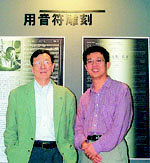
composed by Lu Yen (�c��, 1930-2008)
�@
��O�ڪ��D
����s���@�M�����ɶ�
�b���������������j��
���ԹO�ɥ��ܪ����H
�b�V�骺�W�H���X�{
�@�M�p�ߺݹL�Ӫ��A������
����
�p�ߦa�[�W�}�A�[�W��
�����ͩ�
�����㶼
�A�H��½�}���n��
�����u�p���@���֥y���G
�u�S�]���@�ɡF�M��
�b�S�]���X�X���n�K�K�v
�o�����������O�S�]�̪�
�S�]�A�w�b
�U���U�`��������
�@�M��
�Ѽ��ӷŦӲD
�@�Ǥߨ�
�Ѹ֦ӹڦӤH��
�p�G�b�j�N�X�X
�b���^�p���ΪZ�L�p����
�@���X�X
���O�b�@�������u��
�L�ȩޤM�����ŧ���c�{
�^���P���A�˩���H�b�e
�Ӯɶ��b�{�N�ܤF�t
�����L�F�b�������u��
�A�w�g�ܥ��@�M��������
�@�M��
�Ѫ�ӻ��ӵ�L
�[�Ԫ����H�k�k�Ө�
�ݧA�n���n�A�Ӥ@�M��
�@
(1993)
Translated by Chang Fen-ling
�@
�@
�X�X from The Edge of the Island
�@
�@
�@
�@
�@
�@
10. 18 Touches
�@
�@
Note:
��18 Touches�� (�Q�K�N)
is a Chinese popular song with erotic allusions.
�t,
�u,
�v
(similar to b, p, m) are three
phonetic symbols of Chinese.
Eluan Beak is the southernmost point of Taiwan. Eluan is a
transliteration of the Paiwanese word for ��sail.��
Red-headed Island is also called Orchid Island, where the Yami (the Tau)
people live.
Sosoli is the plural form of ��taro�� in Yami language (soli, the
singular form), and soso means ��breast.��
Turoboan, where the Liwu River runs through, is the ancient name of Hualien,
famous for its Taroko Gorge.
Black Ditch is the old name of Taiwan Strait. Chen Li��s original poem in
Chinese is shaped to the contour of Taiwan.
(2010)
Translated by Chang Fen-ling
���G�Z�q�A���W�y�u�|�v��Ķ���C
�X�X
from
New
Poems
![]()
�@
�@
�@
�@
�@
11. Footprints in the Snow (two versions) (���)
�@
�� Footprints in the Snows (Music: Chen Chiung-yu / Poem: Chen Li)
�@
�@
�@
A. Footprints in the Snow (1976)
Cold makes for sleep
deep
sleep, for
a feeling soft as a swan
Where the snow is soft, a hastily scrawled line is left
in white, white
ink
hastily because of his mood, and the cold:
the hastily scrawled
white snow
�@
�]�N�A�ݭn�ίv
�`�`��
�ίv�A�ݭn
���Z�@��X�n���Pı
���P���a��d�U�@���r��
�åB�u�Υզ�A�զ⪺
����
�]�L���߱��A�]�N
�Ӽ��
�զ⪺��
(1976)
Translated by Chang Fen-ling
�X�X
from
Animal
Lullaby
![]()
�����ֶ��m�ʪ��n�x���n
�@
�@
B. Footprints in the Snow (1995)
�@
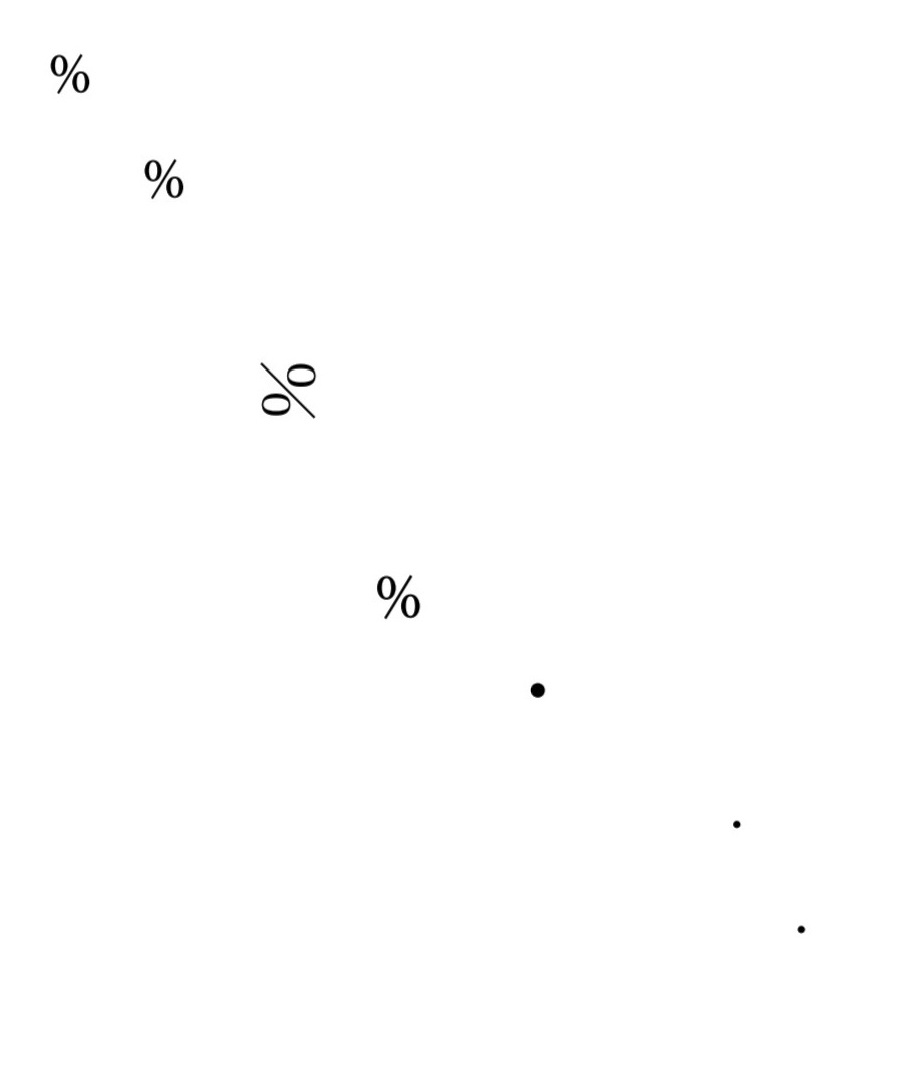
�@
(1995)
Note:
The title of this poem comes from
a piano piece by the French composer
Claude Debussy, ��Des pas sur la neige�� (Preludes: Book 1, No.6).
�X�X
from The Edge of the Island
![]()
�����ֶ��m�q����t�n
�@
�@
�@
�@
�@
12. Autumn Song �q
When dear God uses sudden death
to test our loyalty to the world
we are sitting on a swing woven of the tails of summer and autumn
trying to swing over a tilting wall of experience
to borrow a brooch from the wind that blows in our faces
�@
But if all of a sudden our
tightly clenched hands
should loosen in the dusk
we have to hold on to the bodies of galloping plains
speaking out loud to the boundless distance about our
colors, smells, shapes
�@
Like a tree signing its name
with abstract existence
we take off the clothes of leaves one after another
take off the overweight joy, desire, thoughts
and turn ourselves into a simple kite
to be pinned on the breasts of our beloved:
�@
a simple but pretty insect
brooch
flying in the dark dream
climbing in the memory devoid of tears and whispers
till, once more, we find the light of love is
as light as the light of loneliness, and the long day is but
�@
the twin brother of the long night
�@
Therefore, we sit all the more
willingly on a swing
interwoven of summer and autumn, and willingly mend
the tilting wall of emotion
when dear God uses sudden death
to test our loyalty to the world
�@
*
�@
���˷R�����ά�M����
����ڭ̹�@�ɪ����s
�ڭ̥����b�L�ѻP��ѧ��ڵ��������H
�������L�@���ɱפF���g�窺��
�V�ﭱ�ӨӪ����ɤ@�u�O�w
�Ӧp�G��M�A�ڭ̺�����
�b�Ǧ⤤�P�}�F
�ڭ̶ե��n����b�]�������쪺����
�V�L��ɪ�����j�n���X�ڭ̪�
�C��A����A��
���@�ʥΩ�H���s�b�d�Uñ�W����
�ڭ̳���ѤU�P����n
�ѤU�L�����߮��A����A��Q
�����@����ª�����
�O�b�ҷR���H���ݫe
�@����¦Ӭ������ΧO�w
�b�·t���ڸ�½��
�b�⨫�\���P�ջy���O�и��k��
����A�A�@���A�ڭ̵o�{�R�����P
�t�I���������A�Ӻ�������A�u�O
�������]���p�ͥS��
�ڭ̩�O��̤ߧ��b�L�ѻP���
����Ӧ������H�W�A�̤߭�
�@�����ȤF���P������
���˷R�����ά�M����
����ڭ̹�@�ɪ����s
�@
(1993)
Translated by Chang Fen-ling
�X�X from The Edge of the Island
�@
�@
�@
�@
�@
�@
13. Spring
�K��
�@
�@
Oh, world
our hearts have
become legitimately and healthily lustful again
�@
*
�@
�ڡA�@��
�ڭ̪��ߡA�S
�X�k�Ӱ��d�a�]���_�ӤF
�@
�@
(1992)
Translated by Chang Fen-ling
�X�X
from
Traveling in the Family
![]()
�����ֶ��m�a�x���ȡn
�@
�@
�@
�@
�@
14. Furniture Music
�a�㭵��
�@
�� Hear Chen Li reading the poem "Furniture Music" in Chinese
�@
I read on the chair
I write on the desk
I sleep on the floor
I dream beside the closet
�@
I drink water in spring
(The cup is in the kitchen cupboard)
I drink water in summer
(The cup is in the kitchen cupboard)
I drink water in fall
(The cup is in the kitchen cupboard)
I drink water in winter
(The cup is in the kitchen cupboard)
�@
I open the window and read
I turn on the light and write
I draw the curtains and sleep
I wake inside the room
�@
Inside the room are the chairs
and the dreams of the chairs
Inside the room are the desk
and the dreams of the desk
Inside the room are the floor
and the dreams of the floor
Inside the room are the closet
and the dreams of the closet
�@
In the songs that I hear
In the words that I say
In the water that I drink
In the silence that I leave
�@
*
�ڦb�Ȥl�W�ݮ�
�ڦb��l�W�g�r
�ڦb�a�O�W��ı
�ڦb���d�ǰ���
�ڦb�K�ѳܤ�
�]�M�l�b�p���[�l�W�^
�ڦb�L�ѳܤ�
�]�M�l�b�p���[�l�W�^
�ڦb��ѳܤ�
�]�M�l�b�p���[�l�W�^
�ڦb�V�ѳܤ�
�]�M�l�b�p���[�l�W�^
�ڥ��}����ݮ�
�ڥ��}��O�g�r
�کԤW��î��ı
�ڿ��Ӧb�ж��̭�
�b�ж��̭��O�Ȥl
�M�Ȥl����
�b�ж��̭��O��l
�M��l����
�b�ж��̭��O�a�O
�M�a�O����
�b�ж��̭��O���d
�M���d����
�b��ť�쪺�q��
�b�ڻ����ܸ�
�b�ڳܪ�����
�b�گd�U���H�q��
�@
��
Hear the song "Furniture Music" (sung in Chinese) composed by Lu Yen (�c��, 1930-2008)�@
�@
�@
(1995)
Translated by Chang Fen-ling
�X�X from The Edge of the Island
�@
�@
�@
�@
�@
�@
15. In the Corners of Our Lives
�b�ڭ̥ͬ�������
�@
�� Hear Chen Li reading the poem "In the Corners of Our Lives" in Chinese
�@
In the corners of our lives live
many poems
They may not have reported to the domiciliary registration office
or received doorplate numbers from the district office or police station
Walking out of the alley, you bump into a jogger speaking on the cell phone
His embarrassed smile reminds you of the aged doctor who polishes his
young wife's red sports car in front of the house every night
You realize then that
they are two sections of
a long poem
Objects are known
to each other, but not necessarily on
visiting terms
Some float up to become images, courting and showing affection
for others. Sound and smell usually conspire first, flirting with each other
on the sly. Colors are the coy little sisters who must stay home
get set the curtain, sheet, bathrobe and tablecloth, wait for their master
to return, and turn on
the lights. A poem, like a home, is a sweet burden
sheltering love,
lust, pain and sorrow, taking in the good and the bad
They needn't go to the health center to be sterilized or to buy condoms
although they do have their own ethics and family planning
Couples of well-matched family backgrounds do not always make
the best matches
Water can
mix well with milk, but it can also be mated with fire
Whitehead eats black-boned chicken;
black-headed flies debate over
whether or not a white horse is a horse. Tender violence
Deafening silence
Incestuous love is the
poet's license
Some of them choose to live in the shadow of metaphor or woods of symbols
Some are broad-minded and optimistic, like sunny spiders climbing here and
there. Some
enjoy living outdoors, talking idly and
having intercourse; others, like
invisible gauze
are scattered in your
brain, which is divided into many small suites for rent, from time to time
switching on the spinning wheel of dream or subconsciousness
Many poems are said to be imprisoned in
the room of habit. In
quest of lines you
close the
door, overturn
boxes and cupboards, call out desperately, and even ride an electronic
donkey, drive
the mouse and pound the keys. You
open the window
to the big wide world, and surprisingly, there they are:
Irises after the rain. A flock of gulls
on their way home from school. Slanting
waves of the ocean
The microwave oven boiling tomato soup with slices of bean
curd
It occurs to you to buy some peas. You go to the supermarket and see
cancancancancancancancancancancancancancancancancan
cancancancancancancancancancancancancancancancancan
cancancancancancancancancancancancancancancancancan
You take one can casually and find what you've been racking
your brains for owes
its presence to its very
absence:
cancancancancancancancancancancancancancancancancan
cancancancancancancancan cancancancancancancancan
cancancancancancancancancancancancancancancancancan
A persimmon lies solitarily on the counter. You say
how fantastic, a persimmon lies solitarily on the counter
A line of words forms a family in itself
You can't help suspecting it was immigrated from
Japan, or from the High Tang
when quatrains were flourishing.
But you don't
mind at all. You
don't mind at all that they'll
all fit into
a small shopping bag
�@
*
�b�ڭ̥ͬ����������۳\�h��
���̤]�\�S���V��F�ưȩҥӳ���f
�Ϊ̻��@�Ӫ��P�A�q�Ϥ��ҩά��X��
���X�Ѥf�A�A����@����]�䥴�j���j���C�]���
���������e���A�Q��C�ѱߤW�b�a���e���~���Ӥ�
������]��������͡A���
���̬O�@�����֪���Ӭq��
����M����ۻD�Ӥ����۩���
�@�ǯB�ɦ����N�H�A�V�t�@�ǷN�H
�D�w�ܦn�C�n���M��������ķf�b���A�t�ۤ��q
�n���C�C��O�۩Ī��p�n�f�A���̥����ݦb�a��
�\�]�n��î�ɸn�D�T��y�A���k�D�H�^�a�A��}
�O�C�@���֡A�p�@�Ӯa�A�O���e���t��
���d�R���W�T�A�]�e�v�P���v
���̤��ݨ�åͩҵ��ϩ��ʶR�ץ��M
���M���̤]�����̪��۲z�D�w�M�a�x�p�e
������藍���o�O�̦n���ǰt
���ũT�M�i�H��ġA�����]�i�H���w
�®溸�Y�ձ����A���Y�a���G��
�հ��D���C�ŬX���j��
�_�ձ�Ť���I�R
���ۤ��ʬO�֪��S�v
�@
���̦�����ܬ��b�t�몺���v�ζH�x����L��
�����}�Լ��[�A���������j��|�B�k���C����
���w�\�����S�M�ͳ��X�A���ǫh�����Ϊ���
���G�b�����\�h�p�M�ХX�����A�������A����
�}�ʹکμ�N�Ѫ���´��
�\�h�־ڻ��Q�}�T�b�ߺD���ж��C�A����
�V�y�A½�c���d�A�W�W�I��A�Ʀ��M�۹q�l�j
�X���ƹ��A�V��j�M�C���}����
�e�ѫp�a�A���̩~�M�b���̡J
�B�᪺�����C��Ǧ^�a��
�@���ó��C�n�ת�
�����i��
�N�ۤ@��f�X�M�X�����G���L�i�l
�@
�A�Q���٭n�X�ɽܨ��C�A���i�W���ݨ�
���Y���Y���Y���Y���Y���Y���Y���Y���Y
���Y���Y���Y���Y���Y���Y���Y���Y���Y
���Y���Y���Y���Y���Y���Y���Y���Y���Y
�A�H�⮳�F�@���A�o�{���Ť߫��A��N
�D�������A��Ӧ]�ʮu�Ӧs�b�J
���Y���Y���Y���Y���Y���Y���Y���Y���Y
���Y���Y���Y���Y
���Y���Y���Y���Y
���Y���Y���Y���Y���Y���Y���Y���Y���Y
�@�����U�t�W�a�b���ȥx�W�C�A��
���v�A�@�����U�t�W�a�b���ȥx�W
�@��r�ۦ��@��
�A���K�h�å������ۤ饻�Φh���y������
���O�A�������b�N�C�������b�N���̥i�H�����˶i
�@�Ӥp�p���ʪ��U
�@
(2000)
Translated by Chang Fen-ling
�� Hear Greek actress Keraisa Samara reading Chen Li's "In the Corners of Our Lives" at Athens
�@
�X�X
from
New Poems
![]()
�@
�@
�@
�@
16. Butterfly-Mad
�@
�@
Note:
This poem is shaped like a butterfly (or several butterflies).�@
(2001)
Translated by Chang Fen-ling
�X�X from New Poems
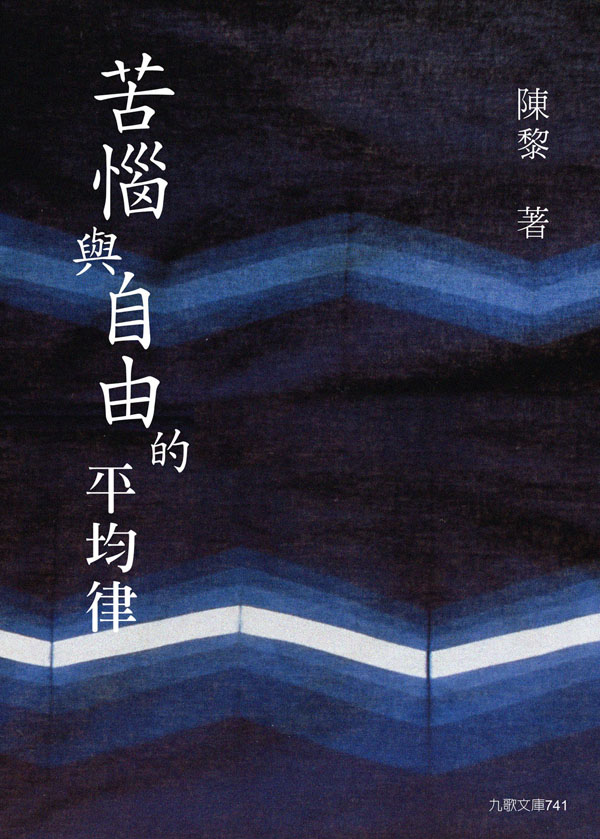
�@
�@
�@
�@
17. Wooden Fish Ballad
�@
�� See Chen Li (in Mandarin Chinese) and Professor Wang Ling (in Cantonese) reading "Wooden Fish Ballad"
�@
This is the seventh autumn visiting here
cool wind as usual; autumn typhoons merciless
My feelings missing you are like the flooded
MRT system, with no trains
and so nowhere to go
I am stranded in memories of the past deeper
than the flood in this city
picturing you glancing at the Hello Kitties caught in the twilight by the window
I am in silent contemplation at the computer desk
as the new ring tone just set on the cell phone
rings like birds chirping, and the newsbar on the TV rolls:
Airport closed, transport cut off by land and air
All these add to my sorrow and annoyance in missing you
The old testament is hard to break. What I have is a coverless
wordless Bible, carrying last night��s wet dream
and leaking from upstairs like an ever-turning waterwheel
dripping on my heart
All wet, every page of scripture about ecstasy of fish and water
poetry and music, our sacred swimming pool
My shining silver-scaled swimming choir
tapped out in rows from electronic wooden fish
pass through the flooded city, through spongy-wrinkly
moonbeams, to swim onto your computer screen
I know how to recall and narrate the merry hours
I remember the day we first met at the theater
I was a wretched and penniless traveler
yet you showed me affection, because of
an unaccompanied aria composed of meaningless vowels
You kept me company by the hotel bedside lamp, inquiring about
the story in the song. I told you the romantic tale
behind ��The Traveler��s Autumn Rue,�� about
Miu Lianxian, how his memory of songstress Mai Qiujuan
left him remorseful on his journey, turned days into years
writing poems, lost in reminiscence, looking for outlets for his sorrow
After hearing my story, you sighed and said
��Your story was really us, how memory
breeds music and images for poetry to recite
how you, a poet, courted me, singing
similar yet different themes
with subtly varied postures and tones; I
was a songbird whose mission
was to sing, but before poetry, a more
melodious songbird
I choose silence in response to voices��
You said my words were pearls, creating
pricelessness out of nothing. I knew you not only saw my talent but
felt no contempt for poverty. My only possession: fabrication
Oh, loveliest of lovers, your attentive listening is
itself singing. I write because you are here
You are not a songbird; you are every singing
and non-singing bird: robin, bluebird, red falcon
sandpiper, snow-owl, swift�K
You are music incarnate
existing prior to poetry. Attracting poetry, accepting poetry
you are the scaffolding for words gone lost
my journey��s lodging house, and in the aquarium of your screen
my shining silver-scaled swimming choir and chanting team
�@
Note:
��Wooden fish ballad�� is a form
of oral literature popular in Guangdong (Canton Province), China.
The wooden fish is a wood percussion instrument used to keep rhythm while
chanting or singing.
��The Traveler��s Autumn Rue�� is one of the most famous in the repertoire of
wooden fish ballads.
��I know how to recall the merry hours�� is a
translation of a line from Baudelaire��s poem ��Le balcon.��
�o�O�ګȩ~���a�ĤC�Ӭ��
�D�����H�A���L��
����A�������A�n�Q���T��
���B�t�ΡA�������o
�o�B����
�����L�b��o�ӫ����n����`��
�啕�ƪ��l�и�
�Q���Aڻ���Ӧ��A���e�@�����
�ڿW�̹q����䮨�M
�կ`ť�o���]�w������s�ڹa�n
�a�a�T�_�A�S�u���q�������O���X
�����ʳ��A���ť�q���_�r��
IJ��K�T�A�o���h�H
�¬������C�ڦs�ê��O�@���S���ʭ�
�S�����媺�t�g�A�p�d����F�G
�t���e�]�ڪ���Ӫ��|��
�I�w�b���Y
����F�A�o�@�����������w���g��
�ֻP���֡A�ڭ̯��t����a��
�ڪ�����{�{���q�a��
�@�C�C�A�۹q�l�쳽�V�X
��L�n���������A��L�K�p������
���A���A���ù�
�ڪ��D��˰l���w�֪��ɨ�
�Q����A�@�|�쨣
�ڽa�~�@���n�p�~
���A��h���V�ۧڡA�]�@��
��������A�L�����Ľ�
�A�t���ۦ����f�ȧ��Y�O�A�Ӱ�
������G�ơC�ڧ�m�ȳ~���n
�o�q���y���L�A�D�A���쨺
�[���P�A���кq�k�����S
�p��b�ȳ~���A�פ�p�~
�g�֡A���¡A���d�h
�A�Dť�ڨ��h�Į��A���G�u
�A���Ԫ���p�ڭ̡C�O�Цp��
���ͭ��֡A�ζH�A���֧u��
�g�֪��A�p��V�ڨD�R�A�q��
�H�p�P�S���P���D�D
�H�ӷL�ܤƪ����աA�n�աF��
���Ӥ]�O�@����V�A�ڪ�����
�Y�q�ۡA���b�֡A�t�@��
�֪���V�e
�ڿ�ܵL�n�靈�n�v
�A���گ]�Y�����A�L���ͦ�
��L���C�ڪ��A���~�����A��
���h�C�کҦ����u�O����
�ڡA���H�������H�A�A����ť�Y�O
�q�ۡC�ڮѼg�A�]���A���s�b
�A���O�@����V�A�A�O�Ҧ��q��
�P���q�۪����J����A�Ťs���A���G
�F�f�A�����A�B�P�K�K
�A�O���諸����
���֦Ӧs�b�C�l�֡A���Ǹ�
�g�����y�r���N�[
�ګȳ~���H�J�C�b�A�ù�������
�ڪ�����{�{����a���A�q����
�@
���G
�쳽�ѡA�y���s�F�A�H�쳽���`�����ۤ�ǡC�䤤�u�n���v�@���A�ҥμ־��H���^���D�A�t���\�]�B��B�G�J�B�T�����A�̥X�W�̦p�m�ȳ~���n�C
�Ѿ\���[�}�D�s�m����Dz��������֡n�]1981�A���y�X�����q�^�C�u�ڪ��D��˰l���w�֪��ɨ��v�A�i�S�ܺ��q���x�r�]��Le
balcon���^�֥y�C
�@
(2001)
Translated by Chang Fen-ling
�@
�@
�@
�@
18. Postcards for Messiaen
�����𪺩��H��
�@��
Hear the song "Postcards for Messiaen" (sung in Chinese) composed by Lu Yen (�c��, 1930-2008)�@
1
We are all hanging
Tears
Stars
Rainbows
Birds�@
Over the abyss of time
singing
singing�@
A garden of sorrow in the air
2
We run on a terrestrial globe
I am in ancient Asia
you are in distant Europe
Someone revolves the earth
we stumble, falling together into
the melancholy ocean
3
The suffered but serene ocean�@
Breathe
Breathe
Breathe�@
Love
�@
Note:
These poems are written according to some of the music I have heard recently, especially that of Messiaen (1908-1992),
Nono (1924-1990), Webern (1883-1945), and Takemitsu (1930-1995). Takemitsu said, "The joy of music, ultimately, seems connected to
sadness. The sadness is that of existence. The more you are filled with the pure happiness of music-making, the deeper the sadness is."
*�@
1
�ڭ̳��O�a���۪�
�\
�P�P
�m�i
��
�b�ɶ����`�W���W
�q��
�q��
�~�T���Ť����
�@
2
�ڭ̦b�a�y���W�b�]
�ڦb�j�Ѫ��ȲӨ�
�A�b��������ù��
���H��ʦa�y
�ڭ̥����A�@�_���J
�~�{���j��
�@
3
�I�l
�I�l
�I�l
�R
�@
���G
�o�Ǹ֮ھڪ��O�ڳ̪�ť���@�ǭ��֡A�S�O�O���� (1908-1992)�A�տ� (1924-1990)�A�Q�� (1883-1945) �P�Z���� (1930-1995) ���C
�Z�������G�u���֪��߮��A�W�A���G�P�s�T�����}�C���s�T�O�ͦs���s�T�C�V�O�P�����ֳЧ@���º�߮����H�A�V��`��o�s�T�C�v�@
(1990)
Translated by Chang Fen-ling
�X�X from Traveling in the Family
�����ֶ��m�a�x���ȡn�@
�@
�@
�@
�@
19. Autocracy
�W��
�@
They are lawmen tampering with grammar at will
Singular yet accustomed to the plural form
Objects presuming to be subjects
Hungry for the future tense when young
Indulging in the past tense when old
No need for translation
Resisting all changes
Fixed sentence patterns
Fixed sentence patterns
Fixed sentence patterns
Only one transitive verb: suppress
*
�L�̬O���N«���k�����k��
��ƦӺD�νƼƧΦ�
�������D�~�D��
�~�����ɭ��Q�����Ӧ�
�~�Ѫ��ɭg�ʹL�h��
�L��½Ķ
�ڵ��ܤ�
�T�w�y��
�T�w�y��
�T�w�y��
�ߤ@���Ϊ��ʵ��G����
�@
(1989)
Translated by Chang Fen-ling
�X�X from Rainstorm

�����ֶ��m �ɫB�n��
�@�@
�@
�@
�@
20. The Ropewalker
������
Now what I sustain is, floating
in the air, your laughter
your laughter, through the obscure quivering net
What if a ball larger than a roof should be thrown over?
Would it drive you into sudden melancholy?
A ball like the earth, pouring onto your face the unfastened
islands and lakes (just like a wheelbarrow with a loose screw)
Those black and blue bruises are the collisions with mountains
the metaphysical mountain ranges harder than iron wheels
the metaphysical burdens, anxiety, metaphysical aestheticism...
And the so-called aestheticism, to me, who tremble in the air
is perhaps only a restraint from a sneeze, an itch, with
the head still up
�@
What runs over you at the same
time is the joke system of
all continents and subcontinents, interwoven in your body like tributaries
a joke not very funny: black humor, white terror
red blood. Red, because you once blushed with your heart fluttering
for the beloved girl (of course you can't forget the hatred and bright red
blood
aroused by jealousy and fury...) But you're simply a ropewalker
walking on the earth, yet discontented with only being a ropewalker
walking on the earth
�@
Now what I sustain are
the subjects left behind by the
departed circus: time, love, death, loneliness, belief
dreams. Will you thus unpack the parcel before a houseful of
silent audience? The moment of sudden solemnity after roaring laughter
You simply pull out, wipe, rearrange the earth's internal organs
those spare parts that make the world move, sunshine leap
the male and the female animals reach their orgasms...
They don't even know why you stay there
stay there (restrain from sneezing and itching)
a wingless butterfly turning a somersault where it is
�@
So you tremble in the air,
cautiously constructing
a garden of jokes on the dangling rope
cautiously walking across the earth, propping up
the floating life
with a slanting bamboo cane
with a fictitious pen
*
�� Hear Hao Jia-xin reading Chen Li's poem "The Ropewalker"
in Chinese
�@
�p���ڱ��O�A���b�Ť��A�A�̪����n
�A�̪����n�C�z�L����Ÿ�ݪ���
�p�G��L�Ӫ��O�@�Ӥ�γ��٤j���y�O�H
���|�ϧA�̬�M�~�{�_�ӶܡH
�@�ӹ��a�y�@�˪��y�A��S����q���A��y
�]���P�F�����v���W�����^�ɭ˦b�A���y�W
���ǵ��ª���ˬO�P�s�ߪ��I��
���K���ٰ��w���ΦӤW���s��
�ΦӤW���t��A�J�{�A�ΦӤW�����P�K�K
�өҿ��P�A���b�Ť�Ÿ�ݪ���
�]�\�u�O�Ԧ��Q���A�Ԧ��o�A�~��
���Y���_��
�P���ӹL�Ӫ��O�Ҧ��j���P���j����
���ܨt�ΡA�e�y���´��A���餺
���j�n�������ܡG�¦���q�A�զ⮣��
���⪺��G�C����A�]���A���g���ҷR���k�l
�y���߸��L�]�A�۵M��L�k�ѰO�]������
�]������A�]���R�Ҥް_����A�o��
�A������G�K�K�^�ӧA�u�O�@�Ө�����
�@�Ӧ樫��a�y�A�S���̤ߥu�O�樫��a�y��
������
�p���ڱ��O���h�������ίd�U��
�D�D�G�ɶ��A�R���A���`�A�t�W�A�H��
�ڡC�A�N�o�˧�]�q�u�}�b���Τl�R�q��
�[���e���ܡH����j�����M�Y�ª��ɨ�
�A�u�O��a�y����Ŧ�ǥX�ӡA�����A����
�������@�ɲ��ʡA���������D�A���۩ʻP
���ʰʪ��F�찪�骺�s���K�K
�L�̬Ʀܤ����D�A�����b����
���b���̡]�Ԧ��Q���A�Ԧ��o�^
�@���S�����l�A��a½���檺����
�ҥH�A�b�Ť�Ÿ�ݡC�ԾԹ����a�b
�a�Ū�÷���W�c�v���������
�ԾԹ����a���L�a�y�A���_
�B��
�H�@��ɱת��ˬ�
�H�@���c����
Translated by Chang Fen-ling
�X�X from The Edge of the Island
��
�@
�@
In
Front of the Temple
Animal
Lullaby
Rainstorm
Traveling in the Family
Microcosmos
The Edge
of the Island
The Cat at the Mirror
New Poems
Microcosmos II
Introduction to Chen Li's Poetry
by Chang Fen-ling
�@